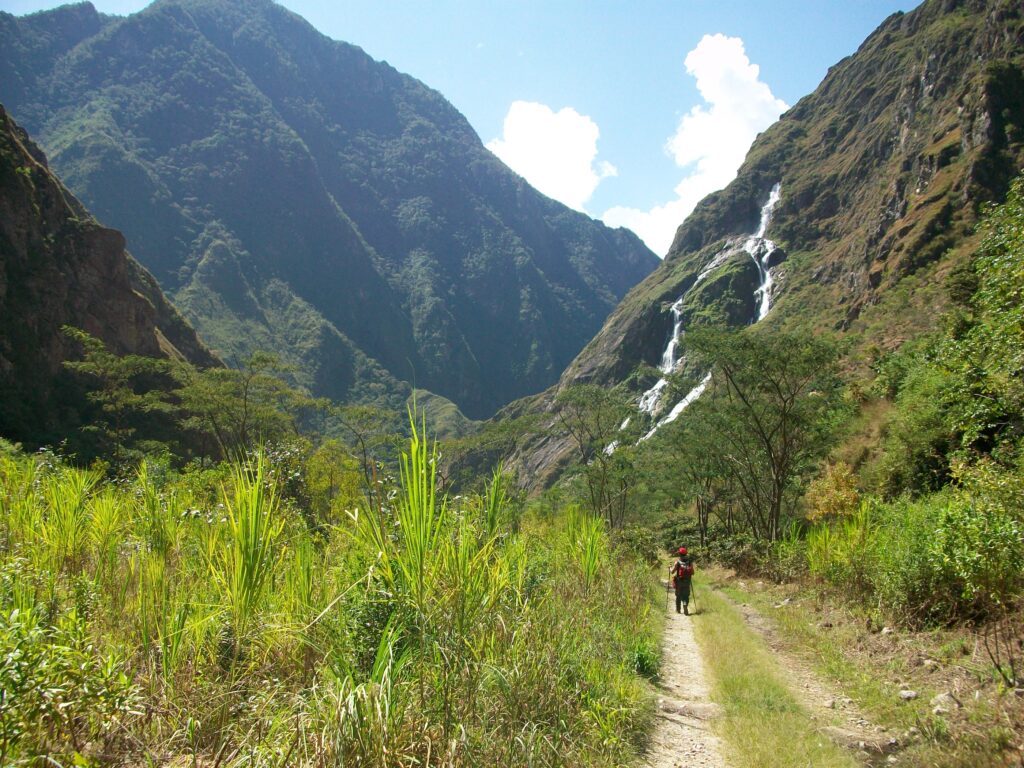| The Salkantay Trail |
Trekking through the Peruvian jungle along the Salkantay Trail is described as the “back way” into Machu Picchu; used as a farmer’s trail for hundreds of years, and before that, the Inca themselves, tourists have for the most part left the trail undisturbed.
While there is clearly a sense of beauty in the austerity of everything encountered along the way of the trail, one thing is striking about nearly every local you pass: they live in destitute poverty. It is no accident that the humble Peruvians living in the shadows of the mighty Andes here resemble their Incan anscestors; the modern world has simply passed them by.
As we relax at a modest shack near a farm, I notice a stand selling bananas, grown from a tree no doubt nearby. Argelia, the woman behind the stand, has rough and dirty hands, which can only come from an honest day’s work to which few Americans these days are accustomed. After handing over mere cents I eat what is probably the best tasting “platano” I’ll ever have. I would have paid many times over what I was charged here picking a vastly inferior one up from the local grocery store back home.
Perhaps it was just the novelty of seeing the banana tree from which I was eating that made it taste so good, or maybe it was the contrast with the power bars and granola I’d been eating the entire day before, but something about that banana told me it was worth more that what I’d paid.
| Peruvian Chico |
Any economist would laugh at such a statement, as nothing is ever really “worth more” than what you pay – the market price is paid for each and every transaction, which leaves both parties better off. Right? Kind of. The problem with this market, though, is it consists of a few hungry hikers a day, and perhaps a donkey train every once and a while. Where supply intersects demand, there is the price. Holy cow, my econ 101 professor was right! This price is low because there simply isn’t a market, and therefore any demand for these bananas! After coming to this realization and giving my banana peel back to “pacha mama,” or Mother Earth as the Incans say, I make my way further down the trail.
There was a book in class that I read once called “Economics is Everywhere,” by Daniel Hamermesh – after turning down the next valley, the pages of the book came crashing back down towards me: A road under construction.
The past three days of only the sounds of birds chirping, horses neighing, and the dirt under my boots, and now I was greeted by the sound of backhoes and men working!
What most would observe as a grave affront to mother nature’s beauty, I saw as a once in lifetime opportunity for impoverished Peruvian farmers to bring their goods to market. Yes, I agree an unspoiled jungle mountainside is much more easy on the eyes than men with shovels and jackhammers; but what is also beautiful is the advancement of human lives.
| Road construction in the Santa Teresa River Valley |
Farmers selling bananas for three cents to hikers along the Salkantay Trail may now have a chance to bring them to market ten miles down the road in Santa Teresa, a considerable task with just a muddy trail under your feet.
Before you know it, Argelia is selling her bananas for ten cents a piece, not three, and she can now afford to buy her daugter the proper footwear to get to school without getting blisters each day.
Who knows, maybe next year that road will lead to Cuzco, and the little girl may have the chance to start her own rafting company, or save up enough money to go to college in Lima, or heck, even America, when she’s old enough.
The point is, when it comes to economic growth, infrastructure is vital. We should never underestimate the power that a road has in getting us to school, work, or just the neighbor down the road.
Human beings in isolation can only provide for their own needs day by day. This is what society did for thousands of years before the Industrial Revolution catupulted the West into an unprecedented period of economic growth. This is what society is like now for Argelia and BILLIONS of others living in the third world. Markets connect us, roads connect markets, markets enable growth.
Maybe Argelia will never get rich off of selling those bananas, but I’d bet my boots that there are thousands of Americans who’d pay an awful lot more than three cents to taste one like her’s. You do the math.


